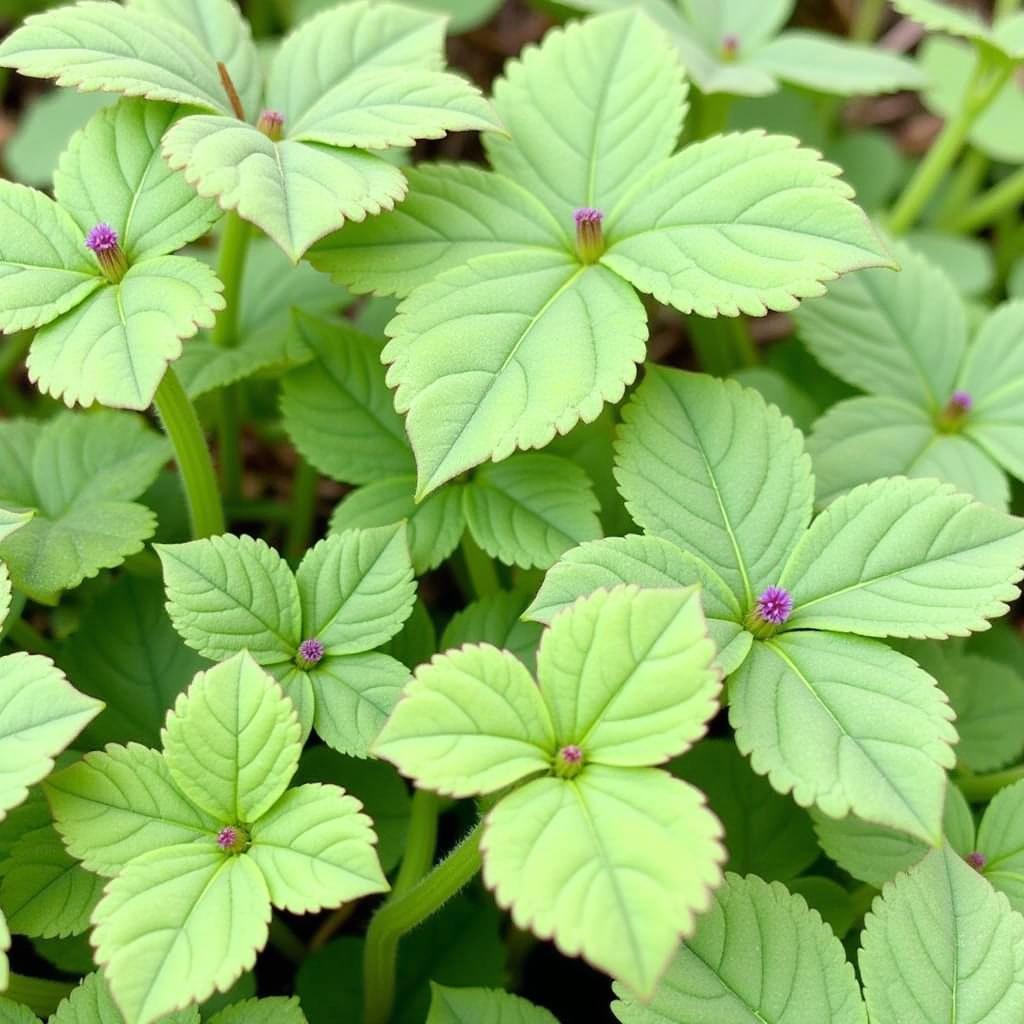What Do Lawn Care Services Use on Creeping Charlie?
Creeping Charlie, also known as ground ivy, can be a persistent weed that plagues lawns, creating unsightly patches and competing with your desired grass for nutrients and sunlight. If you’re struggling to control this invasive plant, you might be wondering, “What Do Lawn Care Services Use On Creeping Charlie that I can’t seem to replicate?” The answer, as with many things in lawn care, is a combination of expertise, targeted products, and consistent practices.
While some homeowners opt for DIY solutions, professional lawn care services often have access to more potent herbicides and a deeper understanding of integrated weed management techniques. This allows them to effectively combat creeping charlie while minimizing harm to your lawn and the surrounding environment.
Unmasking the Enemy: Understanding Creeping Charlie
Before delving into the arsenal of weapons lawn care services employ against creeping charlie, it’s crucial to understand the enemy. This perennial weed thrives in moist, shady areas and spreads aggressively through its rooting stems. Its distinctive scalloped leaves, small purple flowers, and rapid growth make it easily identifiable.
 Identifying Creeping Charlie
Identifying Creeping Charlie
Knowing the life cycle of creeping charlie is also crucial for effective control. It typically flowers in spring, spreading seeds that contribute to its persistence.
Professional Approaches to Creeping Charlie Control
Lawn care professionals take a multifaceted approach to combat creeping charlie, employing a combination of strategies tailored to the specific conditions of your lawn and the severity of the infestation.
1. Herbicides: Targeted Solutions for Effective Control
Herbicides are a cornerstone of professional creeping charlie control. Lawn care services have access to a wider range of herbicides, including selective herbicides that target broadleaf weeds like creeping charlie without harming your desired grass.
Commonly used herbicides for creeping charlie control:
- Dicamba: This herbicide disrupts the growth hormones of creeping charlie, effectively killing it.
- Triclopyr: Another potent herbicide, triclopyr, interferes with the plant’s cell growth, leading to its demise.
- 2,4-D: A selective herbicide, 2,4-D, targets broadleaf weeds like creeping charlie while generally sparing grassy weeds.
Important Note: Herbicide application requires precision and expertise. Incorrect dosage or application timing can harm your lawn and the environment. It’s always advisable to consult with a professional lawn care service for safe and effective herbicide use.
2. Cultural Practices: Strengthening Your Lawn’s Defenses
While herbicides provide a direct attack on creeping charlie, professional lawn care services also emphasize cultural practices that create an environment less hospitable to this stubborn weed.
- Proper Mowing: Maintaining a higher mowing height (around 3-4 inches) helps to shade the soil, making it less favorable for creeping charlie growth.
- Aeration and Overseeding: Aeration helps improve soil drainage and allows for better nutrient absorption, promoting the growth of desirable grass that can outcompete creeping charlie. Overseeding with grass species suited to shady areas can further enhance this effect.
- Fertilization: A well-nourished lawn is more resilient and better equipped to compete with weeds. Professional lawn care services conduct soil tests to determine the optimal fertilizer composition and application timing for your lawn’s needs.
3. Integrated Weed Management: A Holistic Approach
Leading lawn care services go beyond individual solutions, adopting an integrated weed management approach that combines multiple strategies for long-term, sustainable control of creeping charlie.
This approach may involve:
- Preventive measures: Such as preventing soil compaction, promoting good drainage, and choosing grass varieties less susceptible to creeping charlie infestation.
- Monitoring and early intervention: Regular lawn inspections help identify creeping charlie infestations early, allowing for prompt treatment and preventing the weed from establishing a strong foothold.
- Combination treatments: Using a combination of herbicides, cultural practices, and other techniques tailored to the specific needs of your lawn.
Seeking Professional Help: When DIY Isn’t Enough
While DIY approaches can be effective for minor creeping charlie infestations, seeking professional help is often the most efficient and reliable solution for several reasons:
- Expertise and Experience: Lawn care professionals possess the knowledge and experience to accurately identify the weed, assess the severity of the infestation, and determine the most effective treatment plan.
- Access to Professional-Grade Products: Lawn care services have access to a wider range of herbicides, often with higher concentrations of active ingredients, resulting in more potent and faster-acting solutions.
- Safety and Environmental Responsibility: Professional applicators are trained in the safe handling and application of herbicides, minimizing risks to your health, your family, and the environment.
Conclusion
Combating creeping charlie requires a multifaceted approach that addresses its resilience and aggressive growth habits. While DIY solutions may provide temporary relief, professional lawn care services offer a comprehensive and effective strategy to regain control of your lawn. From targeted herbicides to proactive cultural practices, they provide the expertise and resources needed to create a lush, healthy lawn free from the clutches of this persistent weed.

